You get new glasses, either your first pair or the latest in a long run of stronger glasses, and your vision is distorted. Why?
The short answer is your brain hasn’t adjusted to them.
This brings up the question, do you want your brain to adjust to them? Maybe it’s best they don’t. Read on…
Table of Contents
That Shouldn’t be Clear!
When you’re nearsighted, one way your brain learns to judge distance is by how relatively blurry an object is. This can be true either without glasses or with your old weaker glasses that you don’t see sharply through. When you put stronger glasses on that sharpen up your vision to 20/20 or better, suddenly your brain is telling you everything is closer than it should be. You see the details of the rocks on the ground and the blades of grass, and you feel shorter, like you’re right down there in it.
Light Bending
At the same time, stronger glasses (or your first pair of glasses) cause everything to look smaller. This is because of the distance they sit from your eyes. Contact lenses don’t create this effect.
Have you noticed when a nearsighted person wears strong glasses, the sides of their head through the lenses don’t line up with their head outside them? See an example below. The light is bent, and their eyes appear smaller, along with the rest of their face through the lenses. A similar thing is going on from the other direction.
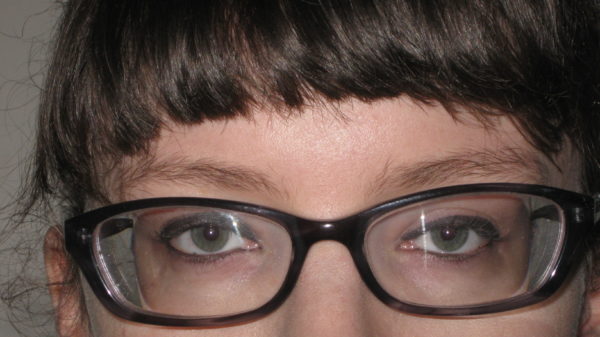
So on one hand the glasses make you feel like objects are closer, and at the same time they look smaller. It’s disorienting.
You might notice other effects too. Objects might seem like they’re curved, or the top is farther away than the bottom. Any number of things. Your visual system is being forced to re-calibrate itself to perceive the world through these weird things you have on your face that it wasn’t made to see through all the time.
Headaches
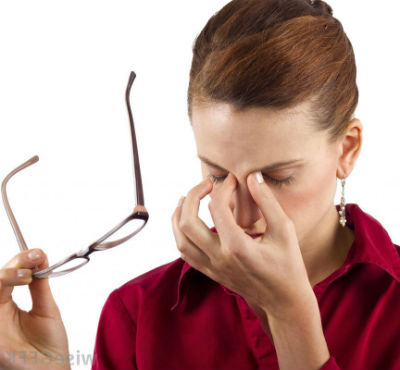
You can be getting a headache from your new glasses no matter if they are prescribed “correctly” or not. Some eye doctors will insist that this means there must be an mistake with the prescription, especially if it was some other eye doctor who prescribed it, or there must be some other vision problem that wasn’t addressed. The rationale is that glasses make things better and that certainly glasses would never be causing these headaches.
Most headaches like these are tension headaches. The pain is caused by muscle contractions in the head and neck regions. A feeling of tightness around the eyes, or within the eyes, is evidence of this, not to mention a stiff neck or a need to massage your temples. Why would glasses be causing this? It has to do with the way you use your eyes. There are bad habits that cause chronic tension as you struggle to do something that your body or brain was not designed to do. This is part of what this website is all about.
Dizziness
The headaches might be related to dizziness. Glasses can make you both dizzy and nauseous. All this stuff can be related. Again it’s a perceptual change that your brain doesn’t know how to react to. The placement of objects, movement, and depth perception has all changed, and your brain doesn’t know how to process it yet to reorient your sense of balance, so you feel dizzy.
It should be noted that dizziness and other problems can also come from bad prescriptions or low quality lens materials. In a 2014 study, 45% of glasses ordered online had incorrect prescriptions.
You Get Used to It
Within a couple weeks you get used to it. Your visual system is amazingly resilient, and it will learn to perceive in new environments quickly.
Or usually that’s the case. Some people never really adapt to the glasses, go see the eye doctor again and again, and come away disappointed.
If you have a hard time getting used to new glasses, maybe your brain is trying to tell you something. Glasses are not good for your vision. Most people who start to wear glasses have to get only stronger glasses over the years. There are some exceptions, but that’s the usual course. It’s unfortunate, because it isn’t necessary.
Don’t Make Me Drink Alone
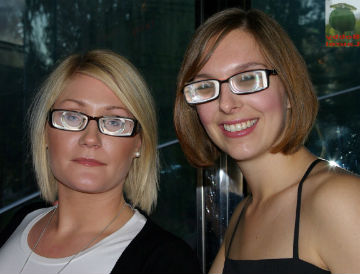
If you run this by your friend who also wears glasses, he will be quick to reassure you that you just need to get used to the stronger glasses. It’s like how drunks don’t want to drink alone. They don’t realize it, but deep inside they feel bad about their drinking habit, but if someone else shares it with them they feel less bad.
Have you ever thought about how you might wean yourself away from glasses for good, and see clearly naturally? Mention this to someone who wears glasses and you’ll most likely get ridiculed and told how there is absolutely no way to reverse nearsightedness other than surgery. But voice your intent to someone who doesn’t wear glasses and you’ll probably get encouragement. Interesting how that works, isn’t it? They aren’t emotionally invested in their condition.
You Can Get Out of Glasses
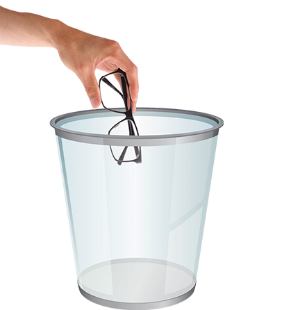
As I said, your visual system is resilient. No matter how nearsighted you are, you can improve your vision and ditch those glasses for good.
See my article The Problem With Glasses. You have plenty of reasons to get out of your glasses. They’re annoying, uncomfortable, restrict what you can do, and what’s more, they make your vision more blurry without them, and you depend on them more and more for everyday tasks.
Although your eyes can adapt to glasses, it doesn’t mean they like it. Eyestrain is extremely common among people who are nearsighted. Glasses discourage some aspects of normal vision, like peripheral vision awareness and free movement of the eyes, that are necessary for the visual system to fully and efficiently process the visual world around you. When your visual system isn’t able to do that, your vision will suffer. Your eyes won’t focus right. You’ll develop other problems.
So think about going back to your old glasses. Were they so bad? Going back to them may help stop your vision from getting worse. The next step is learning to see without them too.
I founded iblindness.org in 2002 as I began reading books on the Bates Method and became interested in vision improvement. I believe that everyone who is motivated can identify the roots of their vision problems and apply behavioral changes to solve them.
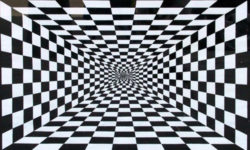
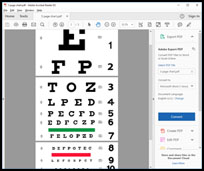
[…] Why New Glasses Cause Bad Depth Perception or Dizziness […]
Get glasses with real glass lenses.
[…] sharpness in your vision, but this will only be temporary as your eyes adjust to the new feeling. Headaches and dizziness are normal in your first day or so, so feel free to take short breaks in between your […]
I started wearing glasses in Gr.3, I believe? So I would have been ~7 yrs old. When I was in Gr.8 (13-14 yrs old), I switched to eye contacts. From that point on, I wore eye contacts every day, 12+hrs per day. I did not wear my glasses at all because they made my eyes look ridiculously small, and I don’t look pretty without my large eyes (so I’m vain, so what?). I’ve been warned several times by my optometrist to not wear my eye contacts so often and so long. But I only started wearing glasses again 2 yrs ago (so when I was 31 yrs old). What I usually do is wear my glasses in the morning (to “give my eyes a break”), and then switch to eye contacts before I go out. But when I wear my glasses, I feel disorientated, dizzy, and nauseous, and I get a headache and see black spots. Yet I don’t have these issues with my eye contacts (I just switched to eye contacts now, and I’m having aftereffects due to the glasses, but that will go away). I did a quick Google search on a hunch, and found this article. It explains everything. So I’m going to stop wearing glasses (I will donate my old pairs), and start wearing eye contacts all day, every day. Re: vision worsening… I don’t think that you can blame that on glasses. While I was wearing exclusively eye contacts, my prescription went from -6.00 to -9.00 over the years. I think that I had better get laser eye surgery (I need to do more research). Thinking that you can somehow “cure” your poor eyesight without surgery sounds like believing that you can live on sunlight alone.
Been wearing glasses for 60 years – nearsighted and astigmatism. Some people are very sensitive to the material being used, and to how well the lenses are ground along the base curve. If you are dizzy and sick after one day – forget it. Find an expert who uses a good lab. Check the lens material. Polycarbonate lenses caused chromatic aberration for me and other problems. Also having problems with Trivex – maybe depth of field – makes for awful dizziness and nausea. Trust your own instincts. If the glasses are causing problems, ask for a redo. About 30 years ago I had 5 redos before someone figured out that the lenses had to be ground along the base curve. As soon as they did that – All was fine, had immediate good adjustment.
What do you mean by ground at the base curve?
Hi Nancy,
I have been in glasses for 48 years, and have experienced all of the problems that you described. In addition the first few doctors had me in plus power glasses, because my complaint was distance blurring after doing close work, and the diagnosis was pseudo myopia. This actually began in high school, and got worse, and at age 33 I went for my first eye exam. I never tolerated the glasses, and they did not solve my initial complaint. Then they threw in some astigmatism correction that was impossible to tolerate, then bifocals, and finally another doctor realized that I needed glasses for myopia. The first few pair were pretty weak, but I wore them all the time with great comfort. The highest prescription was -3.50. Then the need for bifocals kicked in. Now I wear -.50 with a + 1.50 bifocal. On occasion I wear -1.00 for night time, especially driving. I often wonder if I had gotten minus glasses in high school if the myopia would have been much higher.
Ginnie, I have had a weekend in the mountains and now some what refreshed. Firstly your doctors assessment is most probably very accurate and she may have said things which either alarm you with an impending intrusive solution with inevitable uncertainty of a desirable end result / the need to make lifestyle choices and desperate for a 2nd opinion. Ethically I can’t 2nd guess what you are going through nor do I have access to any tests that may have been conducted from your eye history.
Where I am coming from: I have great faith in Homeopathy and was a vegetarian for a decade. I believe that the body has the power to heal itself completely but you have to prepare your self [detoxing body mind and spirit] for that journey. The Bates method while aiming for those who want restoration of clear focusing power suggests actions that also relax your body and mindset which can as a spin-off transform any progress for serious eyesight conditions some [ … not all age related]. I have great respect for the medical research over 100 years or more in Eye surgery today which has made leaps and bounds for diseased eye conditions with billions of dollars investment. Natural vision improvement requires quite a different believe system where a vision educator empowers you to explore possible causes to have the courage to explore and establish a return journey to full or optimum health. Don’t forget YOU have the condition it is essential you are prepared to meet your consultant team with detail accurate objective information on your condition and have the courage to communicate these frankly with your health practitioners [ in an nonthreatening way]- also have ability to ask good questions of them. And listen to the integrity of there answers. Even small insignificant matters can be a clue to a remedy or where to start.
As a prompt what patterns do you notice of each dizzy spell? Before >>> during and after… there duration and environments they happen in. What you do to fast track a more comfortable normal less debilitating situation. May be you have been given pills? What works for you.
Hippocrates said when in pain rest! If that is not an option schedule it! What is essential to an improving a less stressful lifestyle is to recognize what is important and avoid seemingly urgent distractions.
The future is unknown. Best wishes.
Post script: I may be able to respond better to your original question {What else to do} with a more complete picture
Ginnie your eyesight condition a requires a full response. you may have to wait a couple of days. I trust your eye doctor has suggested some approach options. and your are reviewing your options to return emotional balance in the face of an uncertain future. Astigmatism is a cause in lack of perfect corneal symmetry. the Method . Your condition Map dot dystrophy is weakening the cornea. the non conventional approach herbalist base and tangible healing forces. need to get into gear to manage a potential critical condition . supplementation is not regarded as an answer to the average physician. there is an untapped healing source in everyone’s hands the method employs this in palming . Lie down with a pillow on your chest and palm and [get creative put on your top ten favourite music pieces for 30 minutes or more] Take stock of what is happening in your life review worst case scenarios and also the journey into possibilities of curing your condition from my your mind and soul set. thank you for the courage to share with others your condition. Best wishes.
I’ve recently been having off balance issues and went to dr who told me my astigmatism has gotten worse the glasses I got make my eyes feel like they are pulling also was told I have map dot dystrophy is there any suggestions what else to do. This balance issue is very deliberating
Man, I just get hella dizzy and everything seems so distant. It gave me a headache and I’d only been walking with them on for 1-2 minutes.
Hi Mark,
Is this your first pair of glasses?
Snap … Mine are my first pair of glasses and I hate them. I certainly can’t walk in them as I feel like I will fall over.
Did you persevere? Eventually get used to them?
Thank yoiu
I tried glasses for the first time about a year ago. I was getting contacts but got the glasses as backup. Have worn them about 4 times in that year. Contacts are fine but it takes me a good 30 minutes of hell to get anywhere close to used to the glasses and I just cant adjust. I am due for another exam and wont even bother with glasses again. I love my contacts and I am fortunate that my eyes aren’t so bad that I cant go without when I want to take out the contacts. I do that often. Only wear contacts about 7 hours a day. Funnily enough my reading glasses are fine, it is only distance that cause issues
I’ve been wearing my prescription glasses on and of now for a couple of days Iam going so dizzy and unbalanced when I take them of what shall I do persevere or don’t they suit me Iam struggling to get used to them the dizziens is awful
Join the discussion…HI Gemma …. I am having exactly the same issue. I think I was better before the glasses!!! Did you resolve your issue? Or just get used to It? Thank you
A miss-diagnosis is possible as an eye test is itself stressful – perceived as something you don’t want to fail! – request a follow up session, opticians NEED feedback but are rarely concerned. You have everything to gain by sharing that. But they will never achieve a natural cure or a reversal of any vision challenges. Vision Educators are there to empower and coach [students] through vision stressful life styles associated with common weakening focusing skills. Follow your journey, take on board the new habits and principles suggested by your research. Relax – establish deeper restful breathing to suit ALL your daily activities, energize with daily doses of daylight.
David, great blog on bad depth and dizziness. Opening gambit a [first caring question] for those who wear glasses. How long have you needed to wear glasses?
Have you a blog on perception of blur left and right eye/brain mindsets? Bates suggested that ability to make your vision worse is a start of awareness to practice vision fusion games and notice improvement with the desirable outcome of improved combined eye fusion and stereoscopic vision. The journey shows up the two-ness as you swiftly shift detailed distance focus near and far.